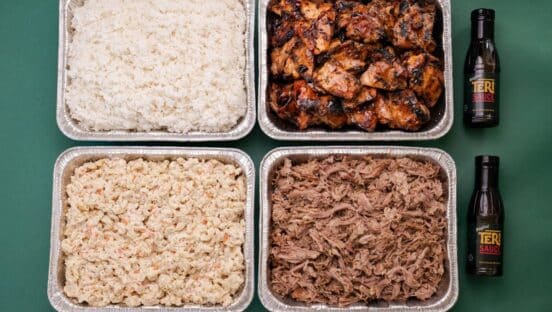Checkers called off its convention as Hurricane Irma gained strength in the Atlantic. The team departed South Florida and drove to company headquarters in Tampa, gearing up for the worst. A chaotic few days passed. Other than some cosmetic scrapes, the system came through in solid shape. But there was something else the storm left behind, says Jennifer Durham, senior vice president and chief development officer. And it’s exactly the reason Oak Hill Capital Partners spent $525 million on the 856-unit brand back in March.
“Natural disasters like this, in unpredictable ways, can be an amazing way to test that fortitude of a family culture,” Durham says.
During its spring sale process, Durham says Checkers and Rally’s had its share of suitors. It chose Oak Hill for a variety of reasons, but the decision for the private equity company, which has more than $10 billion of initial capital commitments since its inception three decades ago, to pick the 32-year-old company is equally telling.
To begin, Durham admits, any company concerned about its bottom line was going to jump on this deal. Checkers’ same-store sales have grown systemwide for six consecutive years, its profitability is up 20 percent, per year, over the past seven. Return on investment is a shade over 60 percent for franchisees and average unit volumes are steady at $1 million, with plans to bump up to $1.2 million by 2020—the year Checkers also expects to hit 1,200 total units.
Durham, who started in accounting and has been with Checkers for 16 years, understands this financial equation better than most. “That kind of return doesn’t come across most private equity firm’s desks very often,” she says. “We also have room to grow almost 4,000 restaurants across the country between company and franchise. It was a no-brainer for a private-equity company that wants to grow.”
And then there’s the less tangible factor. There are 140 franchisees around the country operating a Checkers or Rally’s. Truth is, the company’s unit count makes it seem a lot bigger than it feels, Durham says.
“As an executive team we know each franchisee individually, and we know their families,” she says. “We know what’s going on in their lives. And vice versa. They have a direct line, open line, directly to us. And that sense of family and community is really important when you need to make changes in the business.”
Checkers runs 285 stores on the corporate level. That significant chuck has kept the company’s motives profit—not just top-line—focused. Every move affects each level of the organization.
“It is a stake in the business that gives us that unit perspective, and how each individual restaurant is impacted,” Durham says, “because we need that change to impact us as much as every individual franchisee restaurant. They know philosophically that we feel that way and they support us because of that.”
Durham saw the relationship materialize as Irma blanketed the state. Franchisees checked in with corporate; executives touched base with operators. “That sense of community is not present in all systems,” she says. “This tight-knit system is a competitive advantage for us. And I think it was really tested [during Irma]. But franchisees and operators are resilient. And they’re amazingly connected during all times. But particularly during times when we’re tested the most.”
Checkers was riding a wave of momentum heading into its convention, Durham says, and “won’t let anything slow us down, including a big ol’ hurricane.”
The brand’s growth is right when it wants it to be, she says. Recent data reported that 86 percent of the chain’s current franchisees are looking to add a restaurant to their portfolio. Checkers’ real estate team is tacking on 30–40 new sites each week to its pipeline for new operators to choose from. There are about 250 active locations in the works and, as of March, 130 new stores were approved and in the process of coming to life.
Having Oak Hill enter the conversation was like “throwing gasoline on a fire,” CEO Rick Silva said following the initial announcement.
From a development perspective, Durham has had the chance to add a real estate manager solely focused on sourcing company sites. She also has three to support franchisees. The fact Oak Hill is willing to invest in company-owned unit growth, Durham says, is a sign of two things: One, the company agrees and is aligned with Checkers’ strategy. Next, it understands a profitable and working model when it sees one.
“They have been incredibly supportive of whatever it is we need in order to grow. Sometimes that’s capital and building new company restaurants,” she says. “Other times it’s reimaging company assets. That’s not always something that private equity firms are very generous with. But I can tell you this group has been phenomenal.”
The reimaging aspect is a critical one. By 2020, in addition to the increased AUV and unit count, Durham expects 90 percent of restaurants to be at current image.
The future for Checkers is what it calls “Model 4.0,” a design structure that allows franchisees to choose from three different plans: a traditional on-site build, a new modular building, and a new container building that utilizes reclaimed shipping containers as the structural supports.
Durham and the team planned to take franchisees to the modular design during the convention. She believes the unit is appealing to current and perspective operators, and will play a leading role in Checkers’ expansion.
Firstly, it’s value engineered and the price is fixed. Since the unit is built off site, there is no falling to whims of supply and demand, weather, or other factors that could affect costs. It’s $280,000, takes eight weeks to build, and can be delivered right to the site.
This design has just one drive-thru window as well, eliminating the passenger-side dual format the brand has rolled out in the past. Durham says kitchen upgrades have eliminated the need to feature both, and, in fact, this one-stop model is actually more efficient and quicker.
Durham says the idea that a modular building, like a mobile home, is less structurally sound since it’s manufactured is resoundingly false in this case.
“What folks don’t understand is that this modular building is structurally more sound than a building built on site because of the way in which it’s built. It has to be transported over thousands of miles, so it’s actually structurally sounder. The materials that are used are more industrial. It’s using structural steel as the frame as opposed to a pressure-treated lumber,” she says.
Additionally, in the case that a lease can’t be renewed, an operator can simply pick up the building and move it. “That new design is something that our existing and new franchisees are absolutely thrilled about it,” she says.
The future of Checkers is an exciting one, Durham believes. Targeting 20 percent top-line sales growth in less than three years is something she says the company can achieve thanks to the way it approaches growth, from a transaction and culture standpoint.
“Literally in five years the face of our brand will look completely different than it does today,” she says. “Our goal is to be at 1,200 restaurants by 2020. And we are very well positioned to accomplish that goal.”








